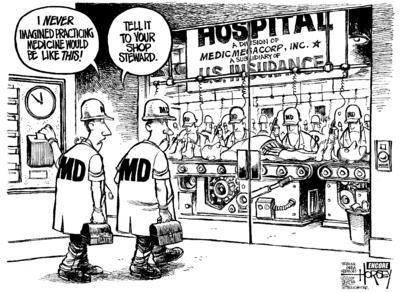- MENU
- HOME
- SEARCH
- WORLD
- MAIN
- AFRICA
- ASIA
- BALKANS
- EUROPE
- LATIN AMERICA
- MIDDLE EAST
- United Kingdom
- United States
- Argentina
- Australia
- Austria
- Benelux
- Brazil
- Canada
- China
- France
- Germany
- Greece
- Hungary
- India
- Indonesia
- Ireland
- Israel
- Italy
- Japan
- Korea
- Mexico
- New Zealand
- Pakistan
- Philippines
- Poland
- Russia
- South Africa
- Spain
- Taiwan
- Turkey
- USA
- BUSINESS
- WEALTH
- STOCKS
- TECH
- HEALTH
- LIFESTYLE
- ENTERTAINMENT
- SPORTS
- RSS
- iHaveNet.com
by Kent Garber

In Opelika, a small city in eastern Alabama a few miles from Auburn University, manufacturing predominates. But so does something else: Blue Cross Blue Shield. About 96 percent of the people in Opelika who have health insurance get it from Blue Cross.
A similar story holds throughout the state and, it turns out, much of the United States.
In the Cincinnati area, WellPoint provides coverage for more than 3 out of every 4 insured people. Nationwide, in fact, most people live in a region where only one or two insurance companies control the majority of the insurance market.
These figures, taken from data published by the American Medical Association this spring, open a fascinating window into the one of the major fights unfolding in the national healthcare reform debate.
The issue came back into focus as lawmakers returned to Washington after the July 4 holiday. That fight, of course, is over whether healthcare reform should include an option for Americans to buy insurance from the government.
President Obama has made it a priority, arguing that a government plan would make the insurance market more competitive and help lower costs. Republicans aggressively oppose this, asserting that a public plan would all but destroy the private market.
The tension between these sides escalated further in the past two weeks as conflicting signals zipped around the city. White House Chief of Staff Rahm Emanuel last week seemed to hint that Obama might not insist on a public option in final legislation. Progressive House Democrats, alarmed, fired off a letter to Obama, who released a clarifying statement from Moscow saying he still "strongly endorsed" a public plan "to force insurance companies to compete."
If any questions remained about where Democratic leaders stood, they have been answered this week. On Tuesday, House leaders finally unveiled their healthcare bill, which, among other things, includes a public insurance plan. So does the Senate Health Committee's bill, which the committee passed by a strictly partisan vote on Wednesday morning.
To a certain degree, Obama's point about the need for greater competition in the insurance market is backed up by the AMA's data.
In Cincinnati, Opelika, and hundreds of other communities across the country, the dominant insurance company has few real competitors today, thanks in part to two decades of aggressive consolidation within the industry. The private market, in other words, is no real market at all, a reality that many observers say has helped drive up healthcare costs.
But whether a government insurance plan would actually bring down those costs remains in doubt. On Wednesday, Congressional Budget Office Director Douglas Elmendorf told the Senate Health Committee that a public plan by itself would have only "a little effect" on costs.
For a public plan to really save money, Elmendorf said, Congress would have to "empower it," possibly by dictating that it pay doctors less than private plans do. That idea doesn't sit well with Republicans, who say it would not only create an uneven playing field for private insurers but also would be widely shunned by doctors and hospitals.
But "empowering" a public plan is exactly what House Democrats appear to be doing.
Their bill, according to the CBO's analysis, would pay doctors only about five percent above Medicare rates and be about "10 percent cheaper than a typical private plan."
To gain bipartisan support for his bill, Senate Finance Committee Chair Max Baucus is considering replacing the public option pitched by Obama with private healthcare cooperatives, which would be regulated but not run by the government. But other Democratic leaders aren't budging.
Senate Majority Leader Harry Reid has told Democrats not to go overboard trying to woo recalcitrant Republicans.